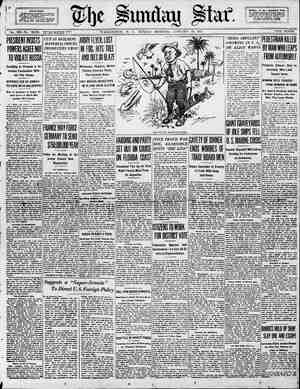Evening Star Newspaper, January 23, 1921, Page 68
You have reached the hourly page view limit. Unlock higher limit to our entire archive!
Subscribers enjoy higher page view limit, downloads, and exclusive features.
THE SUNDAY STAR, WASHINGTON. D. C.—ROTOGRAVURE SECTION—JANUARY 23, 1921 Among Us ‘Mortals The Younger Set By W. E. Hill Copyright. 1921, N. Y. Tribune Inc Of all the victims of prohibition, perhaps those who feel it most cruelly are the young mar- ried couples of the younger set who don’t drink for the simple reason that they don’t en{oy it. [_t,wu bad enough before prohibition set in dodging the before-dinner cocktail, but now it's worse than ever. The evenings they have spent at the country club trying not to look cold sober in the midst of wild bacchanals are bringing the gray hairs! Poor Ethel is telling her woes to Frances and Frances is being awfully sympathetic. . And who wouldn’t be, for the fam- ily doctor has cut Ethel down to twelve cigarettes a day! “Well, my dear, if some one had asked me a few years ago if she had enough on to go from her bed- room to the bath I should have said ‘No! " Two patronesses whose ideas -~ . e P on clothes conform to a much ear- lier era, watching a leader of the younger set. Josephine is a very modern jeune fille in an old-fashioned setting. That is, her mother believes in making her daugh- ter handy around the house, =0 that Josephinewill be all ready for the right man when he shows up. Josephine would like to be out hitting it up with the rest, instead of taking a lunch in to M the cook, who is indisposed. And lunch Josephine will have to look afte: the pan under the icebox, and if the roach exterminator man calls she will have to stick around the apartment and see that he does his work thoroughly. No wonder Josephine is getting the marriage domplex. easiest thing in the world from now on if you study this picture. Modern young girls are easy to talk to—even for an older man who isn’t used to them. They all work around to the same topic—the drink ques- tion. For instance, Mr. Dobbs has started on the subject of the theater. He has asked if Gladys cares for Galsworthy. “Galsworthy? Oh, yes, that was his play the Van Nordens took us to—one of the boys had a bottle of cognac in the back of the box and by the end of the second act —well. really. 1 could hardly see the stage' “Take a hypothetical case, Uncle Ed; suppose Jane here by the time she’s twenty-eight or thirty at the most, is unmarried. Now, wouldn’t it be the sensible thing for her to go out and have an affaire d'amour with—well— say the ice man—than to die without knowing life?”” Uncle Edward, who was brought up with somewhat mid- Viectorian ideas, doesn’t know what has ot into the younger generation. oung people nowadays may not be heavy thinkers—but when they do think! The things they think of! Unc}lfi Edward is completely floored by it all! E How to tell a 1921 débutante from a chorus girl—either going or coming—will be the Roswell and Clay- ton are very much the worse for an evening spent un- der the influence of prohibition. A ellow never knows, these days, where the next drink is coming from —so “take what you get when you can get it” seems to be the slogan, whether you want it or not.
